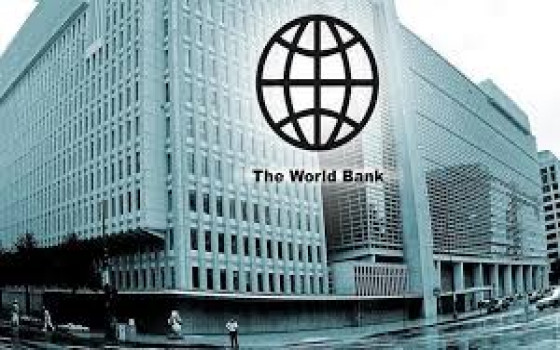
IMF and World Bank meetings in Washington as global economy impacted by trade war. Ministers from Europe, South Korea, Ukraine, Japan, and Turkey meet with their American counterparts.

- Europe and Arabs
- Tuesday , 22 April 2025 8:29 AM GMT
Washington - Brussels: Europe and the Arabs
Finance ministers, central bank governors, and economists are meeting in Washington on the sidelines of the International Monetary Fund and World Bank meetings, amid the global economy's impact from the tense trade war launched by Donald Trump. US stocks fell again late Monday amid renewed fears of economic turmoil, as Trump escalated his threats to fire Federal Reserve Chairman Jerome Powell.
According to Politico, as usual, a group of Europeans are making this twice-yearly visit to the US capital, including Commissioners Valdis Dombrovskis, Maria Luis Albuquerque, and Joseph Sikela, as well as Eurogroup President Paschal Donohoe.
Finance ministers from across Europe will also be in attendance, particularly from France, Germany, Spain, Sweden, Greece, Belgium, and the UK. According to Politico's European edition, distributed in Brussels, the US President will not be in attendance, but he is expected to play a significant role in this week's spring meetings, which are being held just steps from the White House. The impact of Trump's trade war on global markets, the economy, and consumer confidence is likely to dominate the meeting, although the International Monetary Fund expressed optimism last week, predicting no global recession despite uncertainty over trade tariffs being "out of control."
Pushing the envelope: The Spring Meetings are always an ideal opportunity for behind-the-scenes talk, with most of the action taking place away from the main stage. This year, social media is expected to be in high gear as visiting finance ministers seek face-to-face contact with the Trump administration while they're in town.
All eyes will be on US Treasury Secretary Scott Besant, who, based on his past performance, is expected to attend the G20 finance ministers' meeting held on the sidelines of the IMF and World Bank meetings on Wednesday. Besant skipped the G20 in South Africa in February, but he may find it more difficult to miss this time, given the proximity of the US Treasury building to this week's events. South Korean Finance Minister Choi Sang-mook and Japanese Finance Minister Katsunobu Kato have already received Besent, amid White House signals that a trade deal with both countries may be on the table. Turkish media reported that Besent will also meet with Turkish Finance Minister Mehmet Simsek.
As American colleagues reported, the Trump administration is obstructing the work of the two Washington-based institutions. Unsurprisingly, they have yet to appoint members to the governing boards of the International Monetary Fund (IMF) or the World Bank, and they abstained from internal voting—the latest White House snub of global multilateral institutions.
Kyiv's Finance Minister Serhiy Marchenko is also attending the Washington meetings, and a ministerial roundtable on Ukraine is scheduled for later this week.
At last year's IMF and World Bank Spring Meetings, the G20 made progress on the contentious issue of using Russian assets to aid Ukraine—we'll see if this will be raised again this year.
The IMF will publish its World Economic Outlook and Global Financial Stability Reports, which provide snapshots of the state of the global economy. Speaking of trade: European Commission President Ursula von der Leyen told Politico that countries around the world are "getting ready" to work with the European Union. "In an increasingly volatile global environment, countries are getting ready to work with us," the commission president said, without referring to Trump or the United States.
Camille Gies writes that Trump may be the best thing that has happened to free trade—at least for Europe. By building a tariff wall around the United States in support of his "America First" agenda, the president is pushing the world toward cooperation, according to Gies.
Speaking of Trump's gains: European immigrants fleeing Nazi Germany built America's skyline, suburbs, and shopping malls. Will the Trump-inspired American brain drain do the same for the EU? Aitor Hernandez Morales tells the story. The European Central Bank and the European Commission are locked in a bitter dispute over the strength of prominent new rules governing cryptocurrencies. The European Central Bank believes that Trump's generous support for the US cryptocurrency sector risks "financial contagion" that could devastate the EU economy, according to a policy paper seen by Politico, and is calling for an urgent rewrite of rules that fully took effect just four months ago.












No Comments Found